Download Categories
Land and Governance, Women and Land Rights
The Impact of Covid-19 Pandemic on Land Marginalized Communities In Kenya
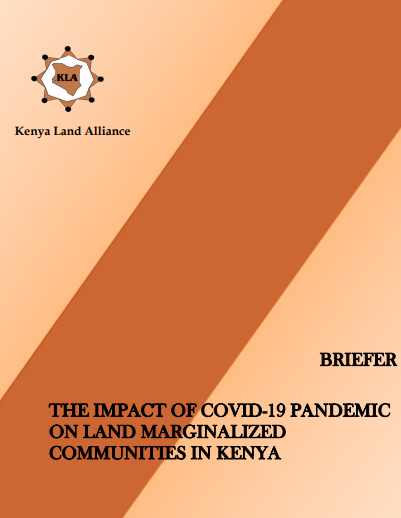
2021-03-24
In the wake of Covid-19 crisis, governments across the world, including that of Kenya, have adopted a raft of far-reaching measures to curtail the spread of the virus. In Kenya, measures put in place include closure of learning institutions, mandatory selfquarantine for all who have entered the country in the recent past, pay cuts for a number of top civil servants, limited movement of prisoners and cessation of prison visits.
The Judiciary and other government institutions have scaled down operations, among other actions. Consequently, the impact of the Covid-19 pandemic has been dire on several fronts, ranging from socio-cultural disruptions to economic reorganization. Just like other frontline sectors, the land sector has been affected too.
Land governance processes have been halted or suspended as a direct impact of the pandemic. The plight of land marginalized communities in Kenya has deteriorated since government containment measures were announced, worsening an already dire situation.
66 downloads
THE RURAL WOMEN’S LAND RIGHTS CHARTER: Towards Achieving Women's Land Rights
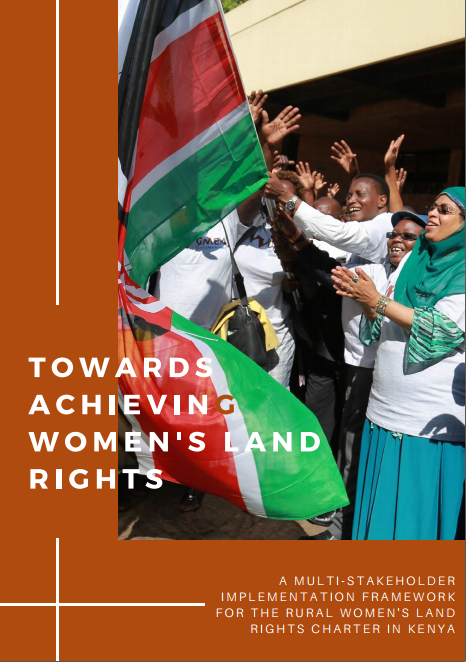
2021-03-24
The Rural Women’s Land Rights Charter of Kenya is a bold expression of the concerns/ issues and their aspirations of women living in rural areas on land matters. At the core of these aspirations is the realization of secure and protected women’s land rights and security for their land-based livelihoods.
Women from rural areas in 24 counties in Kenya highlighted their issues and expressed the kind of change they would like to see on matters land through the Rural Women’s Land Rights Charter. Rural women in a breakfast launch in Nairobi proclaimed this charter on October 13th 2016. During this launch, the Cabinet Secretary in charge of the Ministry of Lands and Physical Planning and the Chairperson of the National Land Commission committed their institutions to fully implement the demands.
196 downloads
Women, Land and Property Rights and The Land Reforms in Kenya

2021-03-24
Land is the foundation of all human activities both social and economic. This is particularly so in agrarian economies such as Kenya. In such economies, women are central to economic production in agriculture and livestock sectors. In Kenya, where the mainstay of most communities is agriculture and livestock production, women contribute up to 80 % of the workforce. Despite this, women only hold 1% of registered land title deeds in their names and around 5-6 % of registered titles held in joint names. It is a pity that women who comprise over half of the Kenya’s population, rarely own any reasonable forms of property, land included.
233 downloads
The Efficacy of Establishing A National Land Commission for Land Administration in Kenya

2021-03-24
Land administration has been described as the set of services that make the land tenure system within a country socially relevant and operational. The National Land Commission provides an elaborate framework through which land governance is undertaken in Kenya, including the implementation of land management policies.
103 downloads
Public Land Tenure and Management of Public Land in Kenya
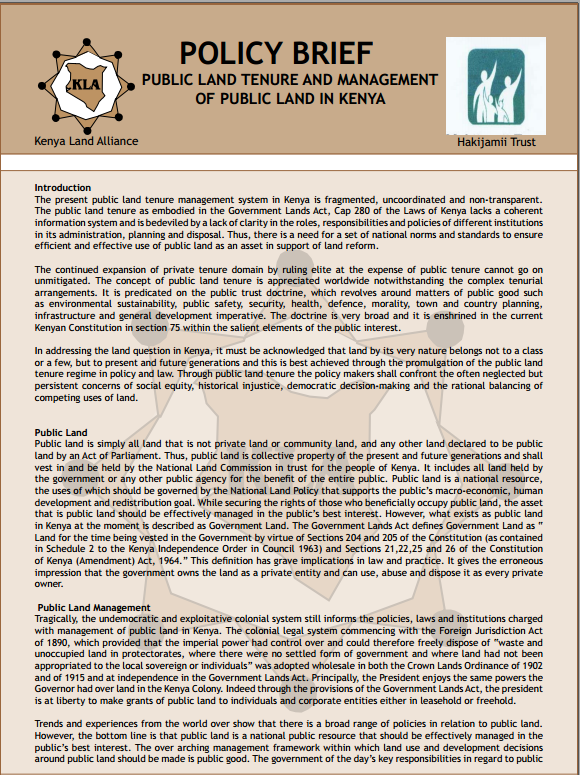
2021-03-24
The present public land tenure management system in Kenya is fragmented, uncoordinated and opaque. The public land tenure as embodied in the Government Lands Act, Cap 280 of the Laws of Kenya lacks a coherent information system. It is bedeviled by a lack of clarity in the roles, responsibilities and policies of different institutions in its administration, planning and disposal. Thus, there is a need for a set of national norms and standards to ensure efficient and effective use of public land.
169 downloads
Land Use in Kenya The case for a national land use policy
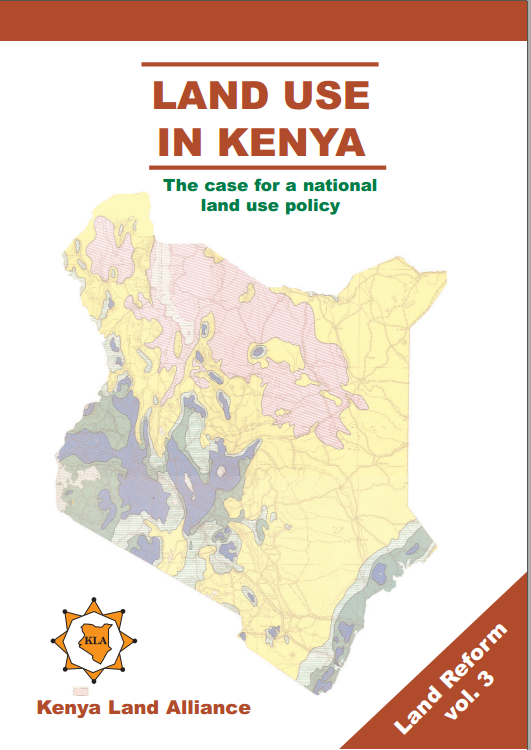
2021-03-24
This book exposes the key land use and environmental problems facing Kenya today due to lack of an appropriate national land use policy. The publication details how the air is increasingly being polluted, the water systems are diminishing in quantity and deteriorating in quality. Desertification process threatens the land and its cover, soil is being eroded leading to siltation of the ocean and lakes. The forests are being depleted with impunity leading to a destruction of water catchments areas. The savannas and grasslands are face overgrazing, charcoal burning and other poor land use practices.
119 downloads
Challenges Facing the Implementation of the Forest Act 2005

2021-03-24
The Kenya Land Alliance (KLA) praises the new Forest Act 2005 for placing forest resources at the core of sustaining both the local and national economies. Indeed locally, forests are a source of food, fodder, wood fuel, construction materials, spiritual and cultural nourishment and traditional medicines among others. The Act, beyond highlighting the environmental and ecological functions of the forest sector, affirms the importance of our forest cover as one of the country’s major national assets, and this underscores the need to conserve our forests.
88 downloads
The National Land Policy in Kenya Must Address Natural Resources
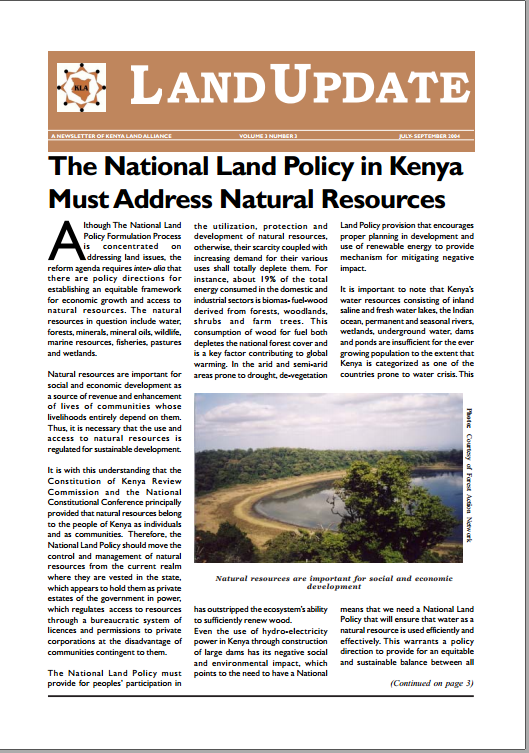
2021-03-24
Although The National Land Policy formulation process is concentrated on addressing land issues, the reform agenda requires inter alia that there are policy directions for establishing an equitable framework for economic growth and access to natural resources. The natural resources in question include water, forests, minerals, mineral oils, wildlife, marine resources, fisheries, pastures, and wetlands. Natural resources are important for social and economic development as a source of revenue and enhancement of lives of communities whose livelihoods depend on them.
45 downloads
Kenya Finally Starts the Process of Developing a National Land Policy
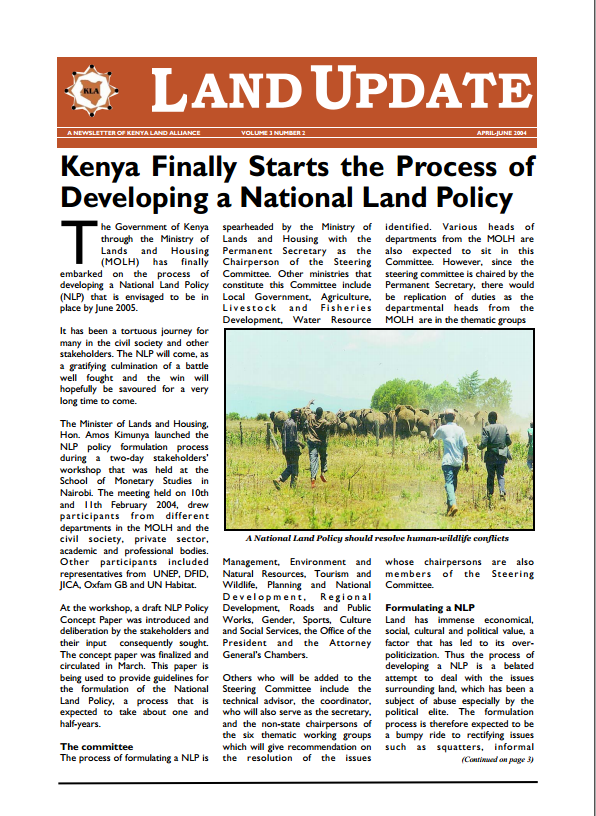
2021-03-24
The Government of Kenya through the Ministry of Lands and Housing (MOLH) has finally embarked on the process of developing a National Land Policy (NLP) that is envisaged to be in place by June 2005. It has been a tortuous journey for many stakeholders, including those in the civil society. The NLP will come as a gratifying culmination of a battle well fought.
The Minister of Lands and Housing, Hon. Amos Kimunya launched the NLP formulation process during a two-day stakeholders’ workshop that was held at the School of Monetary Studies in Nairobi. The meeting, held on 10th and 11th February 2004, drew participants from different departments in the MOLH and the civil society, private sector, academia and professional bodies. Other participants included representatives from UNEP, DFID, JICA, Oxfam GB and UN Habitat
38 downloads
A Critical Look at the Environmental Management and Co-ordination Act (EMCA), 1999
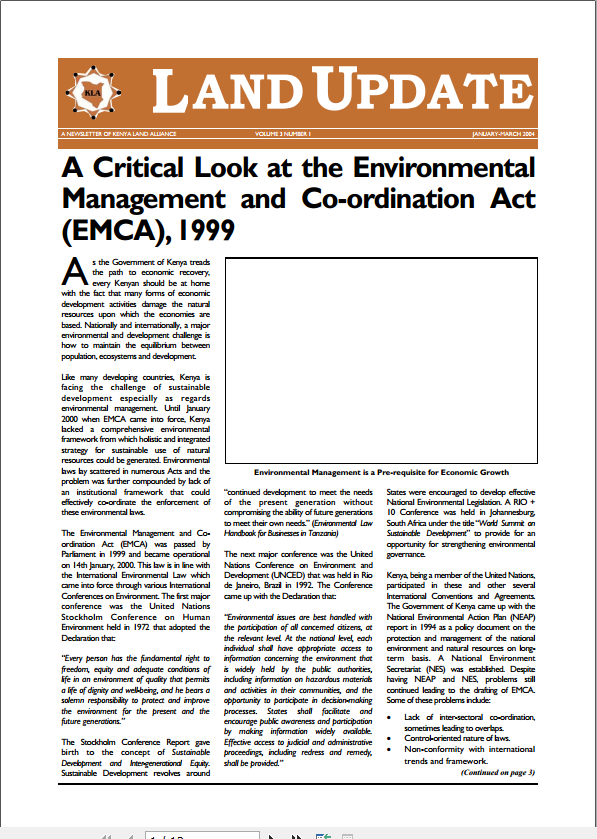
2021-03-24
As the Government of Kenya treads the path to economic growth, every Kenyan should be at home with the fact that many forms of economic development activities damage the natural resources upon which the economies are based. Nationally and internationally, a major environmental and development challenge is how to maintain the equilibrium between population, ecosystems and development.
80 downloads
THE RURAL WOMEN’S LAND RIGHTS CHARTER: Towards Achieving Women's Land Rights

2021-03-24
The Rural Women’s Land Rights Charter of Kenya is a bold expression of the concerns/ issues and their aspirations of women living in rural areas on land matters. At the core of these aspirations is the realization of secure and protected women’s land rights and security for their land-based livelihoods.
Women from rural areas in 24 counties in Kenya highlighted their issues and expressed the kind of change they would like to see on matters land through the Rural Women’s Land Rights Charter. Rural women in a breakfast launch in Nairobi proclaimed this charter on October 13th 2016. During this launch, the Cabinet Secretary in charge of the Ministry of Lands and Physical Planning and the Chairperson of the National Land Commission committed their institutions to fully implement the demands.
196 downloads
Gender Aspects of Land Reform Constitutional Principles
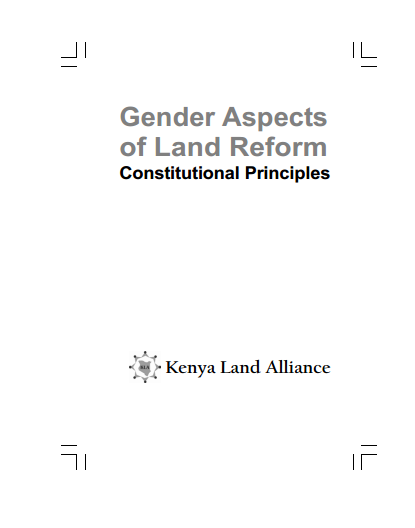
2021-03-25
In this pocket size booklet, Land Reform Volume 4, KLA proposes that collectively as a nation, and especially during this time of the constitutional review process; we must provide women a deliberate opportunity to engage in decision-making as regards land-use,management and ownership.
66 downloads
The National Land Policy in Kenya Critical Gender Issues and Policy Statements
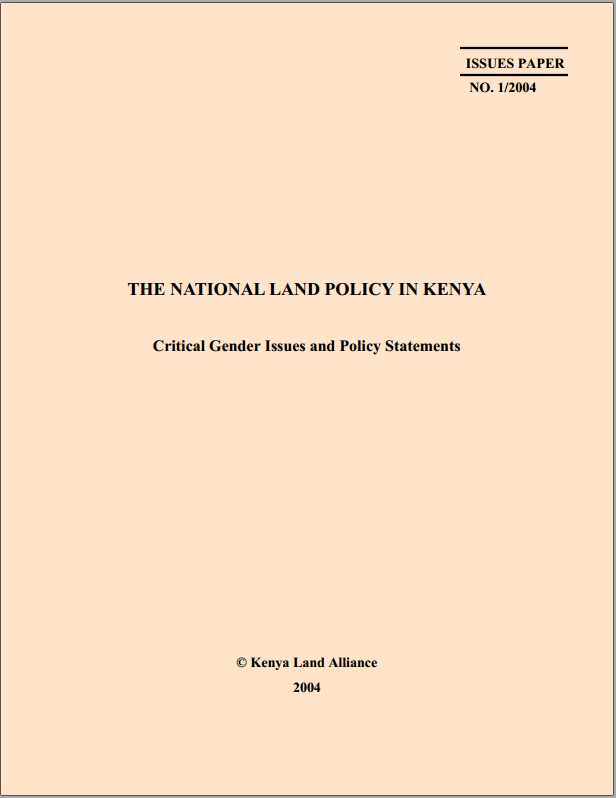
2021-03-25
The purpose of this Issues Paper is to move the debate and stimulate discussion of issues relevant to women’s land rights and social security beyond the unfulfilled demands for gender responsive land policies and land legal framework. It is based on lessons learned from various research findings, Kenya Land Alliance experience and discussions with colleagues with whom we work with in various capacities on land policy and law reforms in Kenya and others parts of Africa.
52 downloads
Kenya Land Issuance Disaggregated Data Analysis
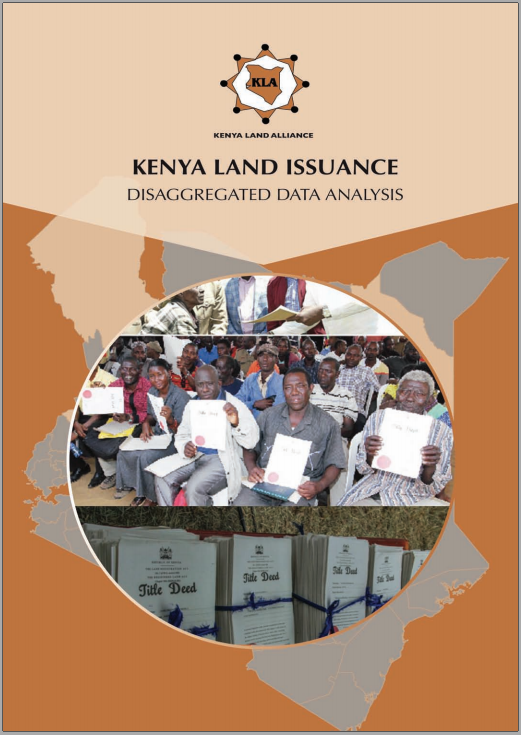
2021-03-25
This booklet reveals that women only got 103,043 titles representing 10.3 percent, while men got 865,095 titles representing 86.5 percent of the total. The glaring disparity is made clear when looked at against the actual land sizes and titled for women against men. The data sample shows that out of 10,129,704 hectares of land titled between 2013 and 2017 women got 163,253 hectares representing a paltry 1.62 while men got 9,903,304 hectares representing 97.76 percent.
205 downloads
Strengthening Women’s Voices in the Context of Agriclutural Investments: Lessons From Kenya
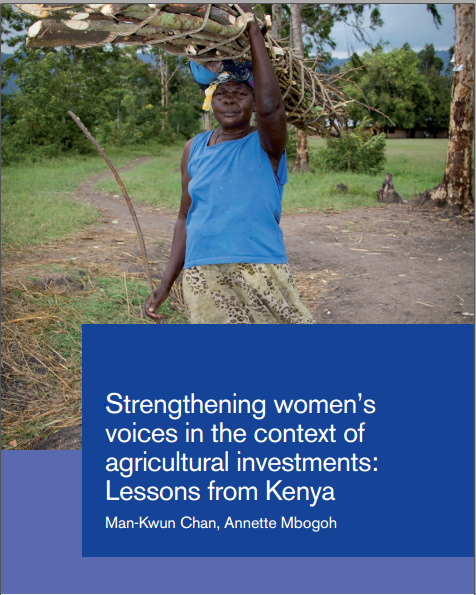
2021-03-25
This report, which focuses on Kenya, constitutes one of four country-wide assessments produced under the overall project. It draws on a literature review conducted by the Kenya Land Alliance (KLA) with additional inputs from IIED, as well as on primary field research conducted by KLA in April 2016 (see Section 1.2 for further information about the research methodology). The primary aim of this report is to inform practitioners, policy makers and researchers about key governance issues relevant to the strengthening of women’s empowerment in community land stewardship and accountability in agricultural investments in Kenya.
85 downloads
Land & Property Rights
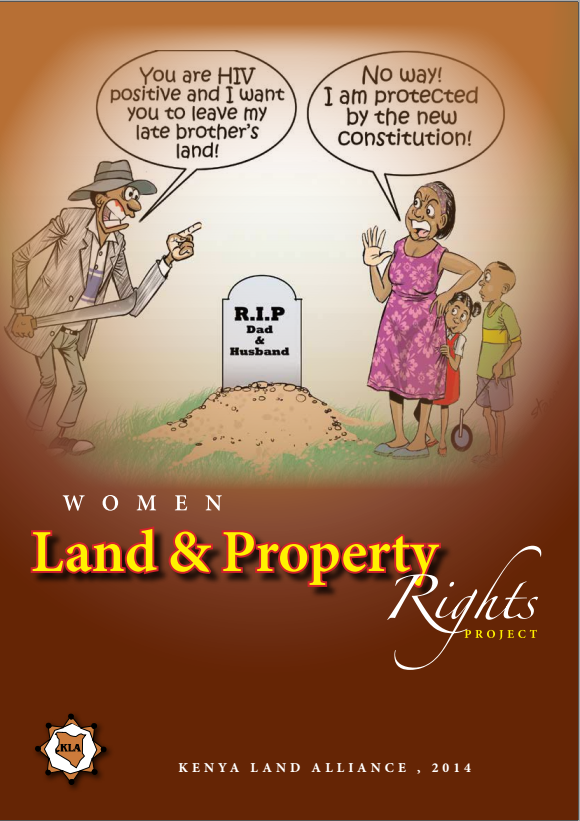
2021-03-25
The women Land Rights Project is a project of Kenya Land Alliance that aims at actualisation Women land and property rights, as provided in the Constitution of Kenya, 2013 and as a means towards poverty alleviation. This considering the fact that, in Kenya where the foundation of most communities is Agriculture and livestock production, women contribute up to 80% of workforce yet they only hold 1% of registered land in their names and around 5-6% of registered titles are held in joint names (Kenya Land Alliance, 2013).
70 downloads
IMPACT OF THE COVID -19 PANDEMIC ON WOMEN IN THE ARTISINAL MINING SECTOR IN Kenya

2021-05-17
KLA undertook a study to highlight the impacts and emerging hidden dimensions of the COVID-19 pandemic on Women in the artisanal mining sector across the Country. From the in depth analysis, it is evident that the pandemic disproportionately affected at least 28 percent of women who depend on small scale mining for their livelihood. Six Counties were sampled i.e Taita Taveta, Migori, Kilifi, Kakamega, Kitui and Kwale.
0 downloads
Accelerating Women and Girl's Rights in Kenya: The Role of the Alternative Justice Systems Policy in Kenya.
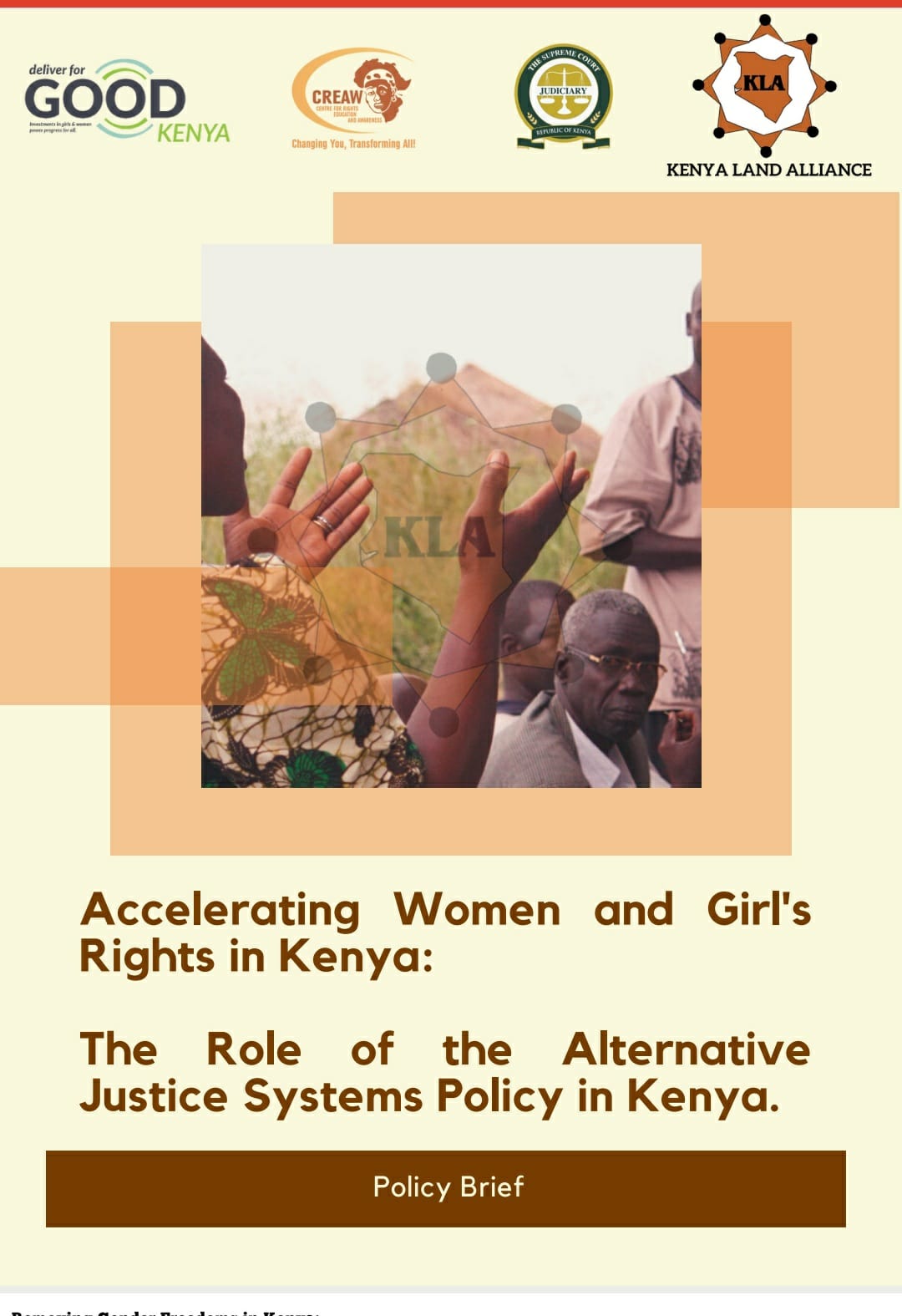
2021-10-22
Kenya Land Alliance in the past few months have reflected on the place of Alternative Justice Systems in advancing women and girl's rights, the policy brief below expounds on the matter,
0 downloads
LAND AND ELECTION VIOLENCE IN KENYA
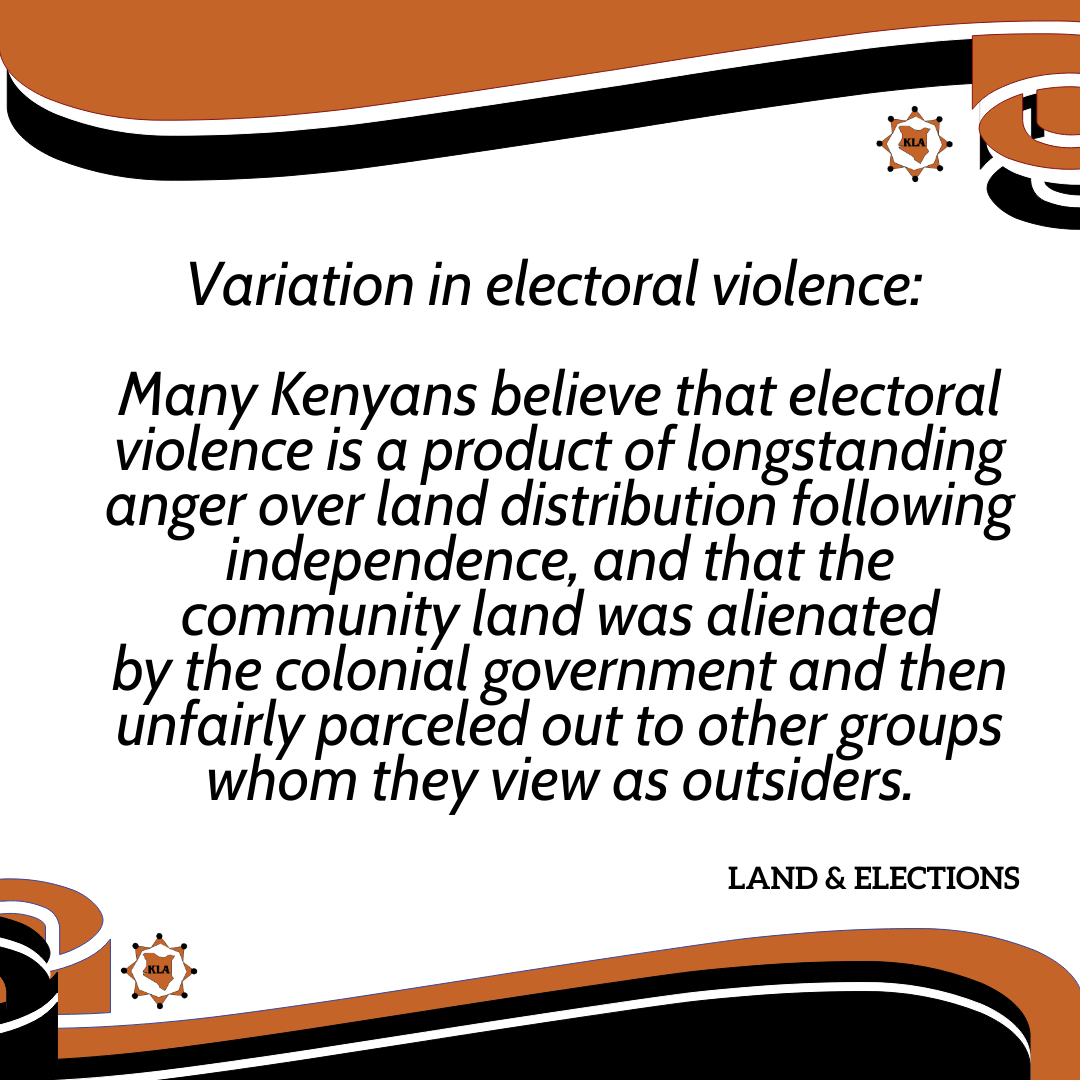
2021-10-26
This policy brief is based on a two-day consultative workshop convened by the Kenya Land Alliance (KLA), August 19-20, 2021, at the Boma Inn, Eldoret. It draws its findings and recommendations from the contributions by delegates from Government (National and County), academia, members of the public, civil society organizations (CSOs), and other non-state actors (NSAs). While the forum was by no means exhaustive on the emotive subject of land and elections in Kenya, the delegates present were unanimous that it provided a welcome entry point on starting a public conversation on the touchy topic of land and elections. The recommendations are captured in the last section of the report, which will form the rationale for the organizers to venture into more partnerships by way of funding through proposal writing
0 downloads
Women in the Artisanal Mining In Kenya
.jpeg)
2021-11-11
Kenya is endowed with a variety of minerals that include Gold, Copper, soda ash, fluorspar, titanium, manganese, iron ore, gypsum, diatomite, chromite, limestone, and silica sand among others⁸. There is a fair documentation of Kenya’s commercial mining and mineral processing operations. Mining is the industry and activities connected with getting valuable or useful minerals from the ground⁹. The mining sector in Kenya contributes about 0.4% of the country’s GDP.
Though mining activity has been present in the country for over 50 years, productivity has remained low. The scale of operations has been limited with only two projects - soda ash and mineral sands - comprising a large part of productive output by revenue. Exploration activity has also been limited even though geological surveys demonstrate a sizeable mineral potential¹⁰. For example, three of the four priciest gems in the world have been found in Kenya. This includes emeralds, sapphire, and ruby in Baringo and West Pokot among others¹¹.
0 downloads
Audit of the Gender Responsiveness of Land Inventories Submitted for Unregistered Community Land in Kenya
.pdf)
2025-04-11
There is a strong positive correlation between women’s secure land rights and their well-being. Land is a fundamentally critical resource for women’s survival and achievement of sustainable development. It is a source of livelihood, thereby overwhelmingly cementing women’s critical space in food production especially provision of labour in agriculture.
In Kenya, land remains a major source of disparity and conflict among many social groups and its access, us e and control are at the heart of the National Land Policy 2009, the Constitution of Kenya 2010 and subsequent legislations including the Land Act 2012 as well as Community Land Act 2016. Truly, Kenya has made positive progress in realizing gender agenda including the promotion and embedment of gender equality and non-discrimination in policies, laws, strategies and action plans.
Evidently, non-discrimination stands out as a critical value and principle in Article 10 of the Constitution that underpins socio-economic and political development as well as governance spheres in the Republic. Despite these constitutional and legal requirements relating to inclusion of women and other marginalized groups in governance, there is a disconnect between policy and practice, giving rise to un-intended misnomer regarding the nexus between de facto and de jure gender equality.
0 downloads
Audit of the Gender Responsiveness of Land Inventories Submitted for Unregistered Community Land in Kenya
_(1).pdf)
2025-05-26
Kenya has made positive progress in realizing gender agenda including the promotion and embedment of gender equality and non-discrimination in policies, laws, strategies and action plans. Evidently, non-discrimination stands out as a critical value and principle in Article 10 of the Constitution that underpins socio-economic and political development as well as governance spheres in the Republic.
Despite these constitutional and legal requirements relating to inclusion of women and other marginalized groups in governance, there is a disconnect between policy and practice, giving rise to un-intended misnomer regarding the nexus between de facto and de jure gender equality.
0 downloads
Undocumented and Disempowered: A Baseline Study on Emergent Property Rights Issues Amongst Immigrant Tanzanian Women in Taita Taveta County.
2.pdf)
2025-07-25
Having a legal identity is a basic right and provides the key to access services and opportunities. In Taita Taveta County, about 30% of women lack basic documents required for land acquisition, economic empowerment and succession processes. The issue is particularly acute for those women from Tanzania but married in Kenya, who face compounded challenges due to lack of proper identification documents.
Many of these women are unaware of their rights, making them vulnerable to land tenure insecurity. Additionally, local administrative officers were found to be either ignorant of the situation or complicit in denying women their rights.
Utilizing Kenya Land Alliance extensive experience in land rights advocacy and community mobilization, Imarisha Wajane Project intended to engage relevant authorities and key stakeholders to better understand and respond to these women's needs. As a result, a baseline study was conducted to analyze the status of women's land rights and economic empowerment, focusing on the challenges posed by lack of proper documentation among Tanzanian women residing in Taveta, Kenya.
0 downloads
REPORT- Undocumented and Disempowered: A Baseline Study on Emergent Property Rights Issues Amongst Immigrant Tanzanian Women in Taita Taveta County.
_Monday.pdf)
2025-07-28
Having a legal identity is a basic right and provides the key to access services and opportunities. In Taita Taveta County, about 30% of women lack basic documents required for land acquisition, economic empowerment and succession processes. The issue is particularly acute for those women from Tanzania but married in Kenya, who face compounded challenges due to lack of proper identification documents.
Many of these women are unaware of their rights, making them vulnerable to land tenure insecurity. Additionally, local administrative officers were found to be either ignorant of the situation or complicit in denying women their rights.
Utilizing Kenya Land Alliance extensive experience in land rights advocacy and community mobilization, Imarisha Wajane Project intended to engage relevant authorities and key stakeholders to better understand and respond to these women's needs. As a result, a baseline study was conducted to analyze the status of women's land rights and economic empowerment, focusing on the challenges posed by lack of proper documentation among Tanzanian women residing in Taveta, Kenya
0 downloads
INTERNATIONAL DAY OF RURAL WOMEN 15TH OCTOBER 2018 PROGRESS IN ADDRESSING WOMEN LAND RIGHTS – RETRACING THE JOURNEY
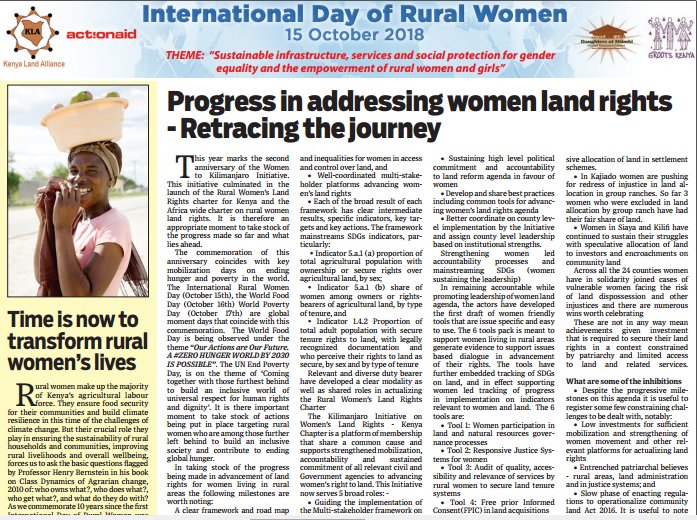
2021-03-25
THEME: “Sustainable infrastructure, services and social protection for gender
equality and the empowerment of rural women and girls”
Time is now to transform rural women’s lives. Rural women make up the majority of Kenya’s agricultural labour force. They ensure food security for their communities and build climate resilience in this time of the challenges of climate change. But their crucial role they play in ensuring the sustainability of rural households and communities, improving rural livelihoods and overall wellbeing, forces us to ask the basic questions flagged by Professor Henry Bernstein in his book on Class Dynamics of Agrarian change, 2010 of: who owns what?, who does what?, who get what?, and what do they do with? As we commemorate 10 years since the first International Day of Rural Women was established on 15th October 2008. We need to ask these right questions in recognition of the substantial proportion of the women’s agricultural labour force, including informal work, and performance of the bulk of unpaid care and domestic work within families and households in rural areas. Women make significant contributions to agricultural production, food security and nutrition, land and natural resource management, yet structural barriers and discriminatory social norms continue to constrain women’s decision-making power and
political participation in rural households and communities. This year marks the second anniversary of the Women to Kilimanjaro Initiative. This initiative culminated in the launch of the Rural Women’s Land Rights charter for Kenya and the Africa wide charter on rural women land rights. It is therefore an appropriate moment to take stock of the progress made so far and what lies ahead.
127 downloads
The Land Sector Non State Actors (LSNSA) is a network of civil society organizations working together to promote secure and equitable access to land and natural resource for all through advocacy, dia
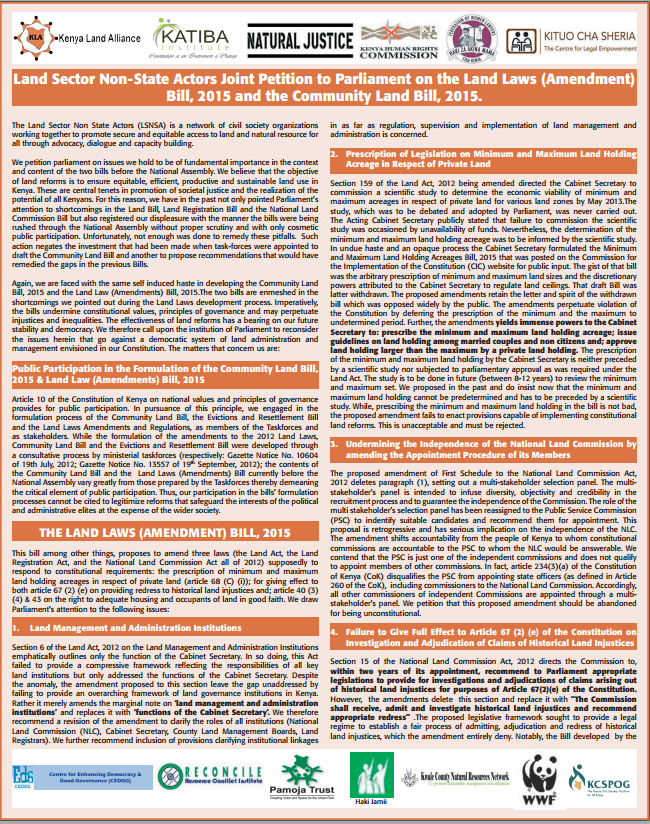
2021-03-25
The Land Sector Non State Actors (LSNSA) is a network of civil society organizations working together to promote secure and equitable access to land and natural resource for all through advocacy, dialogue and capacity building. We petition parliament on issues we hold to be of fundamental importance in the context and content of the two bills before the National Assembly.
62 downloads
Land-Laws-Amendment-Bill-2015
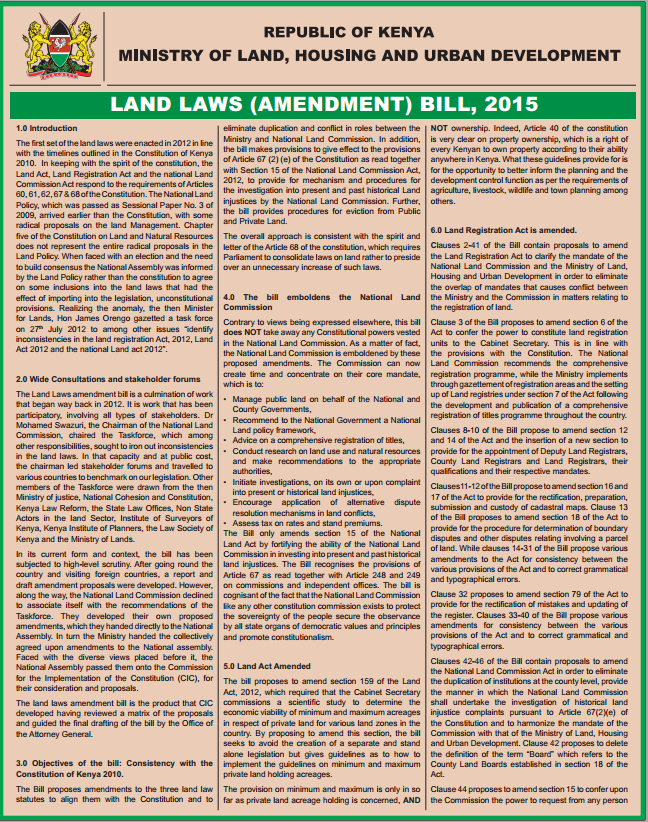
2021-03-25
The first set of the land laws were enacted in 2012 in line with the timelines outlined in the Constitution of Kenya 2010. In keeping with the spirit of the constitution, the Land Act, Land Registration Act and the national Land Commission Act respond to the requirements of Articles 60, 61, 62, 67 & 68 of the Constitution.
51 downloads